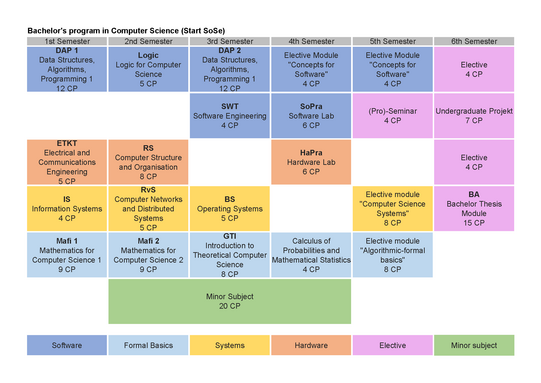
Note: The CPs may vary in certain minor subjects!
Bachelor's degree program in computer science (starts in summer semester)
Study plans help you to organize your studies. Because the contents of the modules partly build on each other, there are participation requirements for many modules, i.e. you must have successfully completed one or more other modules in order to participate in this module. Because of these dependencies, there are few variations for your schedule, especially in the first four semesters.
You will participate in the elective and optional modules as well as in the proseminar and subject project in the last semesters of your studies. You can choose from the offered courses according to your interest. The time when you attend a proseminar, for example, also depends on when a course of interest to you is offered. Please also note the preview of the next semesters.
Your choice of minor will affect your schedule. For some minors, modules may be omitted; you will attend courses in the minor instead. In a few cases, the division of courses into semesters may differ from the recommendations in the module handbook in order to prevent overlaps.
The following plan of study does not address specifics of minors. Please consider the plan as a recommendation and a suggestion to plan your studies.

![[Translate to English:] [Translate to English:]](/storages/zentraler_bilderpool/_processed_/d/f/csm_Informatik_275ba5e5fc.jpg)

![[Translate to English:] [Translate to English:]](/storages/zentraler_bilderpool/_processed_/1/b/csm_Figuren-nachdenklich_e2435967dd.jpg)
![[Translate to English:] [Translate to English:]](/storages/cs/_processed_/6/f/csm_teamwork1_e113f5f13b.png)
![[Translate to English:] [Translate to English:]](/storages/cs/_processed_/e/1/csm_header_ee496f74bf.png)